EAFM ADOPTION IN CENDERAWASIH BAY TN
By Davidson Rato Nono
Training on management performance assessment with Ecosystem Approach to Fisheries Management (EAFM) indicators was held for three days in Manokwari, West Papua from May 21 to May 23, 2014. This training is a continuation of the commitment of cooperation between the Department of Marine Affairs and Fisheries (DKP) of West Papua Province and the Department of Marine Affairs and Fisheries of Teluk Wondama Regency supported by the Cenderawasih Bay National Park TNTC, Papua State University and WWF-Indonesia Teluk Cenderawasih Project. This activity presented instructors from PKSPL - IPB with participants from several agencies such as the Teluk Wondama Regency Marine and Fisheries Service, BAPPEDA Kab. Teluk Wondama, Environmental Agency Ka. Teluk Wondama, Wondama Bay Tourism Culture and Sports Office, TNTC Center, Papua State University, and West Papua Provincial Marine and Fisheries Office.
This training activity, according to Beny A. Noor, Project Leader of WWF Teluk Cenderawasih, aims to introduce a sustainable fisheries management scheme in the waters of the Cenderawasih Bay National Park area, Teluk Wondama Regency, West Papua Province, as well as being one of the tools to complement the Cenderawasih Bay National Park Management Plan that was prepared and established in 2009.
The delivery of training materials was carried out by the PKSPL - IPB team for three days. Starting with the presentation and understanding of EAFM, 6 domains that become the benchmark of EAFM, to the simulation of fisheries management assessment that is currently running in the TNTC area of Teluk Wondama Regency based on indicators from the six EAFM domains. The EAFM assessment simulation uses software that has been developed by PKSPL - IPB together with the National EAFM team.
At the end of the training, the Department of Marine Affairs and Fisheries of West Papua Province and Teluk Wondama Regency agreed to form an EAFM Working Team consisting of various related agencies, including the Teluk Cendrawasih National Park Center, the Department of Culture Tourism and Sports, BAPPEDA, the Environmental Agency, Papua State University and WWF-Indonesia Teluk Cendrawasih Project. In addition, the Marine and Fisheries Service of West Papua province expressed its readiness and commitment to implement fisheries management by considering ecosystem aspects in order to maintain the sustainability of fish resources in the waters of Teluk Wondama district which is also a marine conservation area of Cenderawasih Bay National Park.
This commitment complements the existence of sustainable fisheries management at the Fisheries Management Area level down to the District level, following the initiatives undertaken by WWF-Indonesia in Wakatobi Regency and East Flores Regency.





